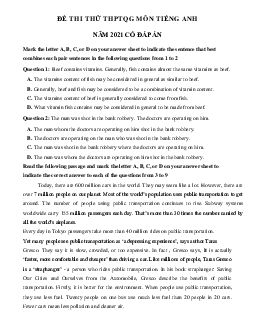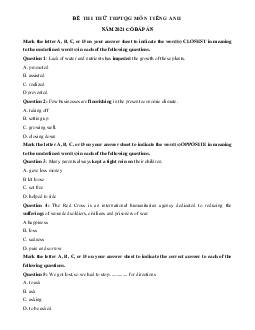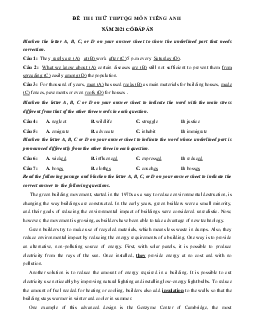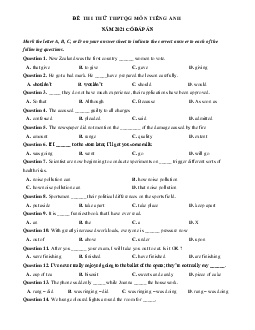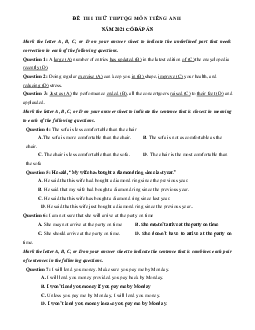








Preview text:
ĐỀ THI THỬ THPTQG MÔN TIẾNG ANH
NĂM 2021 CÓ ĐÁP ÁN
Read the following passage and choose the letter A, B, C, or D to indicate the correct word or
phrase that best fits each of the numbered blanks.
Why is it that many teenagers have the energy to play computer games until late at night but
can't find the energy to get out of bed in time for school? According to a new report, today's
generation of children are in danger of getting so little sleep that they are putting their mental
and physical health at (1)________. Adults can easily survive on seven to eight hours' sleep a
night, (2)________ teenagers require nine or ten hours. According to medical experts, one in
five youngsters gets anything between two and five hours' sleep a night less than their parents did at their age.
This raises serious questions about whether lack of sleep is affecting children's ability to
concentrate at school. The connection between sleep deprivation and lapses in memory,
impaired reaction time and poor concentration is well established. Research has shown that
losing as little as half an hour's sleep a night can have profound (3)_________ on how children
perform the next day. A good night's sleep is also crucial for teenagers because it is while they
are asleep (4)________ they release a hormone that is essential for their 'growth spurt' (the
period during teenage years when the body grows at a rapid rate). It's true that they can,
(5)_______ some extent, catch up on sleep at weekends, but that won't help them when they are
dropping off to sleep in class on a Friday afternoon.
By Tim Falla and Paul A. Davies, Solutions Advanced. OUP Question 1: A. risk B. threat C. danger D. jeopardy Question 2: A. so B. or C. whereas D. because
Question 3: A. effective B. effectively C. affect D. effect Question 4: A. that B. which C. when D. where Question 5: A. at B. to C. in D. on
Choose the letter A, B, C, or D to indicate the word(s) CLOSET in meaning to the underlined
word(s) in each of the following questions.
Question 6: The guards were ordered to get to the king's room on the double. A. in a larger number B. very quickly C. on the second floor D. every two hours
Question 7: We can use either verbal or non-verbal forms of communication. A. using verbs
B. using facial expressions C. using speech D. using gesture
Choose the letter A, B, C, or D to indicate the world that differs from the other three in the
position of primary stress in each of the following questions.
Question 8: A. sacrifice B. understand C. integrate D. recognize Question 9: A. social B. mature C. secure D. polite
Choose the letter A, B, C, or D to indicate the word(s) OPPOSITE in meaning to the
underlined word(s) in each of the following questions
Question 10: You should put yourself on the back for having achieved such a high score in the graduation exam. A. wear a backpack B. praise yourself C. criticize yourself D. check up your back
Question 11: The new policy will help generate more jobs. A. produce B. bring out C. form D. terminate.
Read the following passage and choose the letter A, B, C, or D to indicate the correct answer
to each of the following questions.
Millions of people are using cell phones today. In many places, it is actually considered
unusual not to use one. In many countries, cell phones are very popular with young people.
They find that the phones are more than a means of communication- having a mobile phone
shows that they are cool and connected.
The explosion in mobile phone use around the world has made some health professionals
worried. Some doctors are connected that in the future many people may suffer health problems
from the use of mobile phones. In England, there has been a serious debate about this issue.
Mobile phone companies are bad for your health.
On the other hand, medical studies have shown changes in the brain cells of some people
who use mobile phones. Signs of change in the tissues of the brain and head can be detected
with modern scanning equipment. In one case, a traveling salesman had to retire at young age
because of serious memory loss. He couldn't remember even simple tasks. He would often
forget the name of his own son. This man used to talk on his mobile phone for about six hours a
day, every day of his working week, for a couple of years. His family doctor blamed his mobile
phone use, but his employer's doctor didn't agree.
What is it that makes mobile phones potentially harmful? The answer is radiation. High-
tech machines can detect very small amounts of radiation from mobile phones. Mobile phone
companies agree that there is some radiation, but they say the amount is too small to worry about.
As the discussion about their safety continues, it appears that it's best to use mobile phones
less often. Use your regular phone if you want to talk for a long time. Use your mobile phone
only when you really need it. Mobile phones can be very useful and convenient, especially in
emergencies. In the future, mobile phones may have a warning label that says they are bad for
your health. So for now, it's wise not to use your mobile phone too often
Question 12: The changes possibly caused by the cell phones are mainly concerned with _______.
A. the cells and tissues of the brain.
B. the resident memory.
C. the mobility of the mind and the body.
D. the arteries of the brain.
Question 13: According to the writer, people should ____________.
A. only use mobile phones in medical emergencies. B. keep off mobile phones regularly.
C. never use mobile phones in all cases. D. only use mobile phones in urgent cases.
Question 14: According to the passage, what makes mobile phones potentially harmful is ________.
A. their invisible rays.
B. their raiding power.
C. their radiant light.
D. their power of attraction.
Question 15: The man mentioned in the passage, who used his cell phone too often, ________.
A. abandoned his family.
B. could no longer think by himself.
C. had a problem with memory.
D. had a serious problem with mobility.
Question 16: The most suitable title for the passage could be _________.
A. Mobile Phones: A Must of Our Time B. The Reason Why Mobile Phones Are Popular.
C. The Way Mobile Phones Work. D. Technological Innovations and Their Price.
Question 17: The word "potentially" in the 4th paragraph is CLOSET in meaning to ________. A. certainly B. privately C. obviously D. possibly
Question 18: Doctors have tentatively concluded that cell phones may ________.
A. change their user' temperament
B. cause some mental malfunction
C. change their users' social behavior
D. damage their users' emotions.
Question 19: According to the passage, cell phones are especially popular with young people because ________
A. They are indispensable in everyday communications.
B. they make them look more stylish.
C. they keep the users alert all the time.
D. they cannot be replaced by regular phones.
Choose letter A, B, C, or D to indicate the sentence that is closest in meaning to each of the
following questions.
Question 20: I didn't understand what he was saying because I hadn't read his book
A. I couldn't understand his book because I didn't read it.
B. I wouldn't have understood what he was saying if I hadn't read his book.
C. It was had to understand his book so I didn't understand what he was saying.
D. If I had read his book, I would have understood what he was saying.
Question 21: When the class was over, the student ran out, screamed and shouted.
A. As long as the class finished, the students ran out, screamed and shouted.
B. No sooner did the class finish than the student ran out, screamed and shouted.
C. As soon as the class had finished, the student ran out, screamed and shouted.
D. If the class was over, the students would run out, scream and shout.
Question 22: The police are questioning him at the headquarters.
A. He is being asked to make questions by the police at the headquarters.
B. The police are making questions about him at headquarters.
C. The police are trying to get information from him at the headquarters.
D. Many questions are raised about him by the police at the headquarters.
Choose the letter A, B, C, or D to indicate the correct answer to complete each of the
following questions.
Question 23: All applicants must ________ their university transcript and two reference letters
to be considered for this job. A. submit B. omit C. admit D. permit
Question 24: I find it rather _________ to hear that Jack is getting married next week. A. surprise B. surprisingly C. surprising D. surprised
Question 25: Nam wanted to know what time ________. A. the movie began
B. would the movie begin C. the movie begins D. did the movie begin
Question 26: They live in a very _________ populated area of Italy. A. barely B. hardly C. sparsely D. scarcely
Question 27: The last person __________ the room must turn off the lights. A. who leave B. Left C. to leave D. leaving
Question 28: While studying, he was financially dependent _______ his parents. A. to B. from C. on D. of
Question 29: I don't remember ____________ of your decision to change our vocation plan. A. being told B. to tell C. to be told D. telling
Question 30: It is essential that every student _________ to learn English at university. A. had B. to have C. have D. has
Question 31: The prices at the garage I use are very ___________. A. reasonable B. rational C. acceptable D. logical
Question 32: Although my village is not far away from the city center, we had no _________ until recently. A. electricity B. electric C. electrify D. electrical
Question 33: How can the boss act _________ nothing had happened? A. if B. therefore C. so D. as though
Question 34: Had I studied harder, I _________ better in the last exam. A. would have done B. would do C. had done D. wouldn't have done
Question 35: The singer was _________ on the piano by her sister. A. discarded B. accompanied C. played D. performed
Question 36: Don't worry about trying to catch last train home, as we can easily _______ you up for the night. A. keep B. take C. put D. set
Read the following passage and choose the letter A, B, C, or D to indicate the correct answer
to each of the following questions.
Cities develop as a result of functions that they can perform. Some functions result directly
from the ingenuity of the citizenry, but most functions result from the needs of the local area
and of the surrounding hinterland (the region that supplies goods to the city and to which the
city furnishes services and other goods). Geographers often make a distinction between the
situation and the site of a city. Situation refers to the general position in relation to the
surrounding region, whereas site involves physical characteristics of the specific location.
Situation is normally much more important to the continuing prosperity of a city. If a city is
well situated in regard to its hinterland, its development is continuing prosperity of a city. If a
city is well situated in regard to its hinterland, its development is much more likely to continue.
Chicago, for example, possesses an almost unparalleled situation: it is located at the southern
end of a huge lake that forces east-west transportation lines to be compressed into its vicinity,
and at a meeting of significant land and water transport routes. It also overlooks what is one of
the world's finest large farming regions. These factors ensured that Chicago would become a
great city regardless of the disadvantageous characteristics of the available site, such as being
prone to flooding during thunderstorm activity.
Similarly, it can be argued that much of New York City's importance stems from its early
and continuing advantage of situation. Philadelphia and Boston both originated at about the
same time as New York and shared New York's location at the western end of one of the
world's most important oceanic trade routes, but only New York possesses an easy-access
functional connection (the Hudson Mohawk Lowland) to the vast Midwestern Hinterland. This
account does not alone explain New York's primacy, but it does include several important
factors. Among the many aspects of situation that help to explain why some cities grow and
others do not, original location on a navigable waterway seems particularly applicable. Of
course, such characteristics as slope, drainage, power resources, river crossings, coastal shapes,
and other physical characteristics help to determine city location, but such factors are normally
more significant in early stages of city development than later.
Question 37: According to the passage, a city's situation is more important than its site in
regard to the city's ________.
A. long-term growth and prosperity
B. ability to protect its citizenry
C. possession of favorable weather conditions
D. need to import food supplies
Question 38: The primary purpose of paragraph 1 is to _________.
A. summarize past research and introduce a new study
B. describe a historical period
C. emphasize the advantages of one theory over another
D. define a term and illustrate it with an example
Question 39: The word “ingenuity” in paragraph 1 is CLOSEST in meaning to ___________. A. traditions B. resourcefulness
C. wealth D. organization
Question 40: The word "it" in paragraph 2 refers to _________. A. hinterland B. primacy C. account D. connection
Question 41: What does the passage mainly discuss?
A. Historical differences among three large United States cities.
B. The development of trade routes through United States cities.
C. Contrasts in settlement patterns in United States.
D. The importance of geographical situation in the growth of United States cities.
Choose the letter A, B, C, or D to indicate the sentence that best combines each pair of
sentences in the following questions.
Question 42: We accept that changes are unavoidable. We will not allow everything to be
wiped out, destroyed or forgotten.
A. Despite accepting that changes are unavoidable, but we will not allow everything to be
wiped out, destroyed or forgotten.
B. We accept that changes are unavoidable, as we will not allow everything to be wiped out, destroyed or forgotten.
C. Rather than accepting that changes are unavoidable we will allow everything to be wiped out, destroyed or forgotten.
D. Accepting that changes are unavoidable does not mean that we will allow everything to
be wiped out, destroyed or forgotten.
Question 43: Increasing urbanization has led to problems. Cities are centers of civilization and culture.
A. Although increasing urbanization has led to problems, but cities are centers of civilization and culture.
B. In spite of increasing urbanization has led to problems, yet cities are centers of civilization and culture.
C. Despite increasing urbanization has led to problems, but cities are centers of civilization and cultures.
D. Though increasing urbanization has led to problems, cities are centers of civilization and culture.
Choose the letter A, B, C, or D to indicate the word whose underlined part differs from the
other three in pronunciation in each of the following questions.
Question 44: A. coughed B. crooked C. cooked
D. laughed
Question 45: A. band B. hand C. sand D. bank
Choose the letter A, B, C, or D to indicate the option that best completes each of the following exchanges.
Question 46: - Kate: How lovely your cats are! - David: “____________” A. I love them, too
B. Thank you, it is nice of you to say so
C. Can you say it again D. Really? They are
Question 47: -John: “Everyone should learn more about how to treat the environment well."
- Jack: "____________________________” A. That's not true
B. I am sure about that. C. I don't think so. D. It's not true
Choose the letter A, B, C, or D to indicate the underlined part that needs correction in each
of the following questions.
Question 48: The wooden fence surrounded the factory is beginning to fall down because of the rain A. wooden B. surrounded C. to fall down D. the rain
Question 49: Experts in climatology and other scientists are becoming extreme concerned
about the changes to our climate which are taking place. A. in B. extreme C. about D. are
Question 50: Her passion for helping people have motivated her to found her own charity organization. A. for B. have
C. found D. organization BẢNG ĐÁP ÁN 1-A 2-C 3-D 4-A 5-B 6-B 7-C 8-B 9-A 10-C 11-D 12-A 13-D 14-C 15-C 16-D 17-D 18-B 19-B 20-D 21-C 22-C 23-A 24-C 25-A 26-C 27-C 28-C 29-A 30-C 31-A 32-A 33-D 34-A 35-B 36-C 37-A 39-B 40-C 41-D 42-D 43-D 44-B 45-D 46-B 47-C 48-B 49-B 50-B
